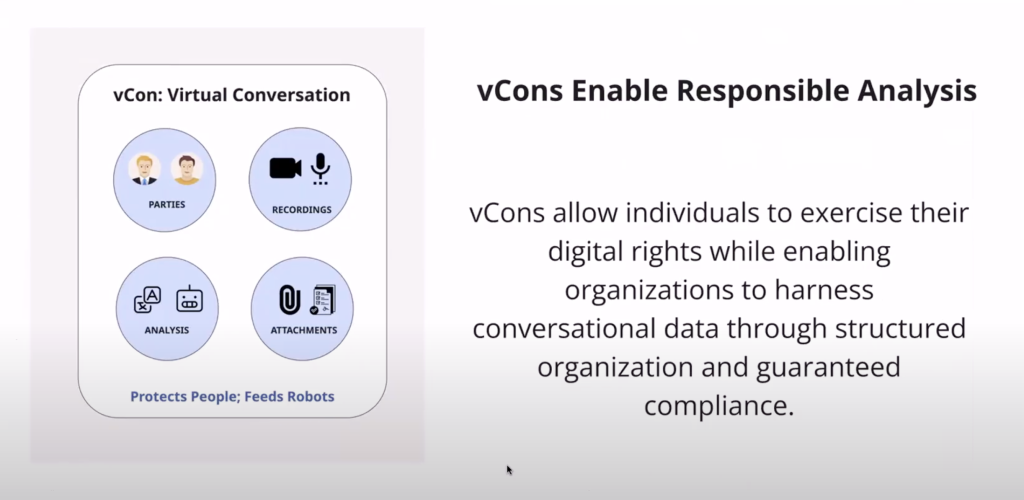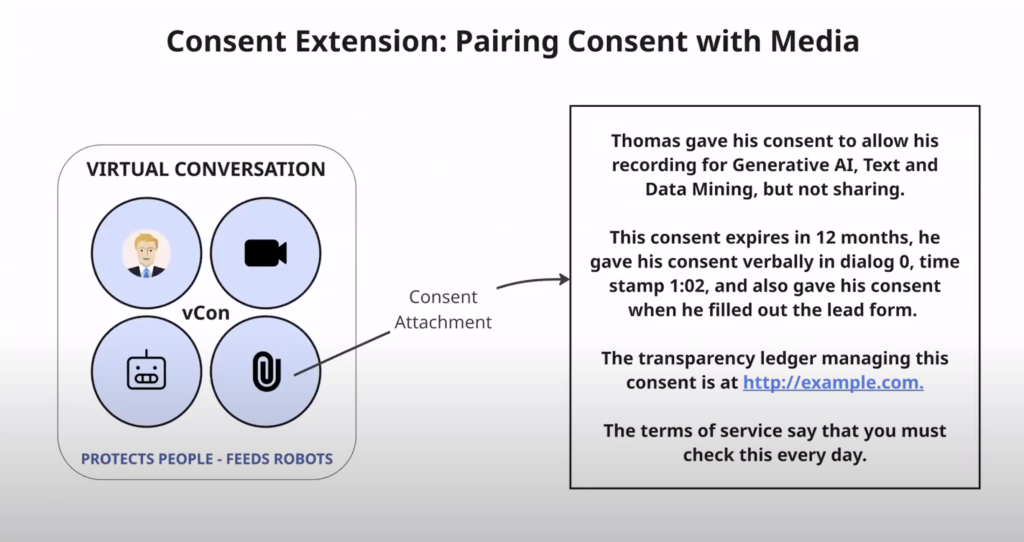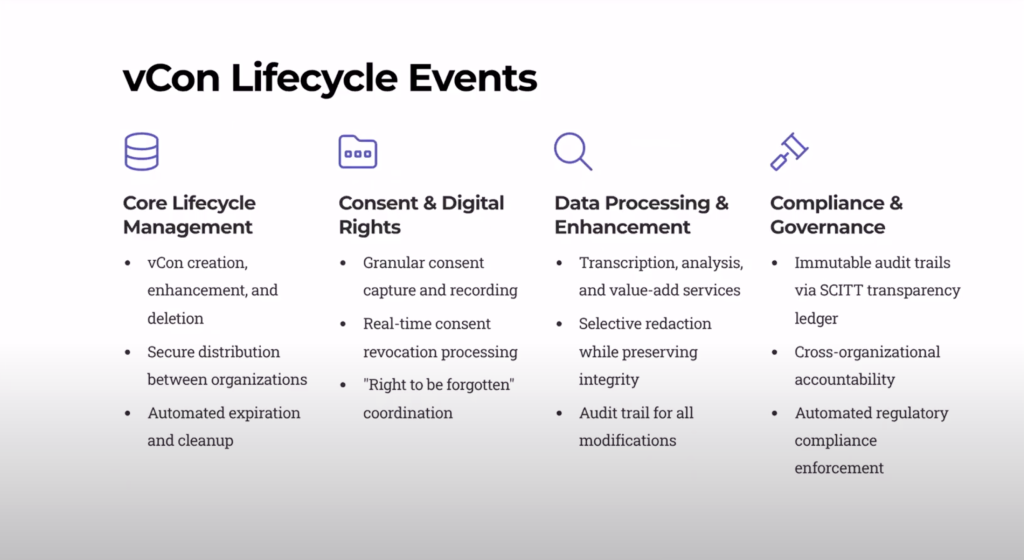Over the summer I had a number of conversations that included vCon. This is a chance for some of the vCon team to share the latest updates.
- Thomas McCarthy-Howe, CTO STROLID, Co-author, vCon (Virtualized Conversations) Working Group, IETF.
- Michael Donovan, VP Marketing, Strolid.
- Claude Hayn, Founder MindMaking, vCon Store
- Audrey Hayn, Product Manager, MindMaking, vCon Store
Mindmaking is really exciting for me, its building the vCon Store, its applications and dashboards; supported by some of the TADHack community. More on that later in this session.
Frontline Announcement
First we discussed the hot off the press announcement from Strolid and Frontline on their strategic alliance that blends empathy, intelligence, and execution. Frontline Group and Strolid are working together to embed vCons (Virtualized Conversations) into the modern contact center.
It’s the convergence of two companies committed to operationalizing empathy at scale. Frontline, with 400 employees and $25 million in annual revenue, brings a human-first approach to customer care across healthcare, finance, and public service sectors. Strolid’s vCon Conserver platform provides the trusted infrastructure to scale that approach, securely, intelligently, and at speed.
The pilot is with 211 contact centers across the U.S., a social services help line, transforming crisis calls into real-time intelligence. With 32 people dialing 211 every minute, the need for more intelligent systems is urgent.
vCons align seamlessly with Frontline’s mission to redefine care through clarity, speed, and human connection. This deployment reinforces Frontline’s AI-enhanced, human-first positioning and elevates its ecosystem play, integrating with NICE, Microsoft, Zoom, and others.
With weeks-to-live speed, Frontline is already scaling vCon use cases internally, from reducing onboarding time to enhancing agent guidance and improving outcome reporting via SCITT-verified dashboards. This enables 211 to share with the organizations funding its operations insight on the value their donations deliver.
Jill Blankenship‘s (founder and CEO of Frontline Group) quote is powerful: “Technology should amplify humanity, not replace it. With vCons, our agents gain perfect recall. Every interaction becomes actionable, transparent, and transformational.” Thomas goes into much more depth on the 211 pilot between 2:30-09:00 on the video.
The overall winner of vcon TADHack this year was vCase by Ahmadu Suleiman. Which provides a similar service in Nigeria.
Strolid’s Progress with vCons
I’m helping my sister-in-law buy a car, the work of Strolid is directly relevant to me. The dealers have a tough time, bombarded by lots of data / leads, some high quality, some rather poor. I tried to find the price of a used car on Edmunds, using their awful mobile interface, it ended up sending my data to 7 dealerships. Hence why I use my laptop for most data search and analysis.
Michael provided a great summary of the 3 core services across Strolid’s 200 dealers, and the impact its having on their numbers. Giving a few examples based on my recent car buying experience:
- Strolid GPT: uses AI to analyze and interpret complex communications to provides accurate insights. For example, to ignore my 7 requests through Edmunds, and use the contact I sent from their website as I looked at a specific car on their lot based on VIN (or mileage and price).
- Conversation Search: find relevant information within large datasets, streamlining the process of data retrieval and analysis. For example, where do buyers that ask for 10%+ discounts beyond our already stated best offer start their car buying journeys? Often they jump between different dealers and not realize what the “internet offer” means.
- Signals: ability to detect patterns and trends within communication data, enabling informed decision-making and strategic planning. I’m sure one of the trends at the moment is on price pressure. Used car prices are rising fast, as are new car prices, so where are customers shifting on year and model? This depends on make, e.g. for Toyotas the difference in price between years has narrowed in the past 2 months.
Data for dealers is critical AND equally the ability to interrogate the data. Michael highlighted the importance of note taking and multi-tasking. In my situation, the sales person at one dealer, took detailed notes covering: people’s names (circled my wife not my sister-in-law as what I assume is either the decider / trouble-maker, clearly evaluating the people), relationships, criteria, selected car, their quote, our offer, our target price, and result (we walked). All this is done in real-time, with the obligatory visit to the sales manager.
Thomas reviewed some of the new people at Strolid including Chris Celiberti. And coming next month they have some big announcements.
Conserver.io, Home of the vCons, And The Conserver (Substack)
Conserver.io
Along with open vCon standards (https://datatracker.ietf.org/group/vcon/about/) in the IETF, and open source vCons (https://github.com/vcon-dev/vcon, see the great session we did with Dan Petrie, https://blog.tadsummit.com/2025/05/02/dan-petrie-the-geeky-side-of-vcon/) is open documentation with conserver.io.
At TADHack this year vCon received many compliments from the developers, impressed with the breadth and depth of the documentation.
The Conserver
If you’re a CTO, privacy professional, or AI practitioner, you’re seeing the explosive potential of conversational data. But you’re also facing a critical challenge: How do you unlock this value while maintaining trust and compliance? This is what the The Conserver substack is for you. Check out the first articles from Thomas:
- Building Trust in the Age of AI: How We Can Finally Use Conversations Responsibly
- Why vCons and SCITT Create an Unprecedented Win-Win for Business and Consumer Privacy
Sign up to The Conserver here.
Consent and Lifecycle
What consent means today has evolved beyond the simple TCPA (Telephone Consumer Protection Act) term of telephone / communications consent. Its now consent for purpose, and its dynamic.
The purpose includes for example AI training, text and data mining, etc. It’s not consent forever, it’s consent with term limits. Remember when Facebook bought WhatsApp, I know many people who would have preferred to withdraw their consent at that announcement. To my car buying example, the consent could be for 2 months as the car should be bought within that time.
This shift enables a better alignment with data privacy and GDPR (General Data Protection Regulation) laws. This is the next step in vCon, and demonstrates an important shift in where the IETF is going.
Thomas then shared some slides around the vCon plans and the 2 sides: enabling citizens to exercise their digital rights, and organizations to use conversation data in compliance with those rights. Put simply, it protects people and feeds the robots.
The update is the consent extension that is paired with the media. In the example below its given verbally in the dialog, what the consent covers, and it’s term limits. Thomas goes into much more details in the video, for example on the anatomy of consent: party identification. dialog references, temporal validity, granular permissions, and cryptographic proof. The work of SCITT and vCon are clearly converging.
The consent extension also includes a link to the terms of service, the consent ledger, and AI-Pref (common vocabulary on what the AI preferences mean). This is not just a US/EU issue, even across the 50 states there’s a need for a common vocab.
I love this phrase, “Consent, unlike love is not forever.” We then compared notes on all the real world examples of where this dynamic permission applies. Thomas then reviews all the events in a vCon lifecycle. And for me the most impressive ability is for vCon to work effectively across national / international regulation, the differences between data processors and controllers, and for a citizen to know what happened to their data. vCon and SCITT together are powerful.
vCon Store
We then wrapped up with Audrey of MindMaking on their work in creating the vCon Store. Thomas’s full vCon vision is being realized!
To help focus the initial work, they are focused on small medium enterprises, and the challenges they face. MindMaking are building:
- vCon App Store, focused on SMB applications.
- Complete infrastructure, including publishing and billing.
- Native applications: custom dashboards and tools.
- Developer ecosystem.
What MindMaking provides is:
- vCon compliant infrastructure
- Marketplace and distribution to SMB.
- Integrated billing for payments and subscriptions.
- Support.
The platform is offered through ITSPs (Internet Telephony Service Providers), Managed Service Providers, and Resellers. It fits nicely within the existing VoIP ecosystem.
To get involved email apply@mindmaking.com.
To all the TADHackers, you now have a path to cash $$$, for the skills you’ve built at vCon TADHack.



